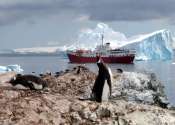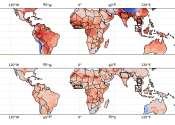Globalization refers to the increasing unification of the world's economic order through reduction of such barriers to international trade as tariffs, export fees, and import quotas. The goal is to increase material wealth, goods, and services through an international division of labor by efficiencies catalyzed by international relations, specialization and competition. It describes the process by which regional economies, societies, and cultures have become integrated through communication, transportation, and trade. The term is most closely associated with the term economic globalization: the integration of national economies into the international economy through trade, foreign direct investment, capital flows, migration, the spread of technology, and military presence. However, globalization is usually recognized as being driven by a combination of economic, technological, sociocultural, political, and biological factors. The term can also refer to the transnational circulation of ideas, languages, or popular culture through acculturation. An aspect of the world which has gone through the process can be said to be globalized. Against this view, an alternative approach stresses how globalization has actually decreased inter-cultural contacts while increasing the possibility of international and intra-national conflict.









